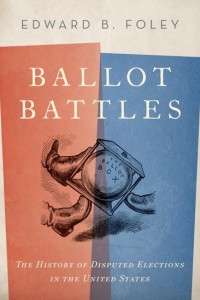The following is the fourth of five guest posts by Ned Foley of Ohio State, about his new book Ballot Battles: The History of Disputed Elections in the United States:
Theme Four: The nation has never fully fixed the institutional inadequacy bequeathed by the Founders (as described in the first of these five posts). When one compares the evolution of the nation’s experience in handling high-stakes vote-counting disputes over the entire course of U.S. history, the good news is that there has been considerable institutional improvement. But, despite this progress, there is room for much more. Although institutional reform in this particular area of election law has been exceedingly difficult, the fact that on the whole the nation’s capacity for handling vote-counting disputes is significantly better now than it was throughout the nineteenth century is reason for optimism that the nation can continue to make progress on this front throughout the remainder of this current century.
Simply put, the nineteenth century suffered much more violence, and threats of civil unrest, as a result of ballot-counting battles than the twentieth century. From Pennnsylvania’s Buckshot War in Pennsylvania 1838 to Arkansas’s Brooks-Baxter War in 1872 to Kansas’s Legislative War of 1893, military confrontation over counting ballots in close elections was not uncommon. The lowest moment came at the end of the nineteenth century, when one of the candidates in Kentucky’s 1899 election for governor was assassinated by his political opponent during the fight over counting votes in that election.
There were also harrowing episodes in which armed conflict was narrowly averted. Maine, for example, in 1879 almost had its own internal civil war, but a leading hero of the national Civil War a decade earlier once again put his own life on the line in an effort to prevent bloodshed over the outcome of elections in his home state. Joshua Chamberlain, who earned his accolades at Gettysburg, was able to rise above partisan strife to resolve the conflict peaceably. It was a prime example of individual virtue stepping in to make up for an institutional deficiency (a dynamic described generally in the previous post).
There was one instance above all others for which America, as a nation, should be especially grateful that military confrontation was averted (albeit narrowly) over an electoral outcome. This dicey episode occurred during the Civil War when Congress convened after the midterm elections of 1862. There is a lot worth saying about these midterm elections, and interested readers are invited to explore the relevant section of Chapter Four. What is especially striking—and generally not well known—is that Lincoln was prepared to use military force to prevent the Clerk of the House of Representatives from siding with Democrats over Republicans in a fight over which candidates had valid certificates of elections that entitled to them to be seated at the beginning of the new congressional session. The Republicans, however, won a key vote that foiled the Democrats’ plot even after having received some assistance from the Clerk—and so, fortunately, Lincoln did not need to send troops onto the floor of the House in order to keep control of the chamber in Republican hands. If he had done so, it would have been an act of Executive interference with the Legislature’s organization of itself that would have been unparalleled in American history and arguably a kind of coup d’etat antithetical to basic democratic values.
In the twentieth century, the risk of military confrontation over vote-counting essentially disappears, obviously a very salutary development. What accounts for it? Part of the explanation is cultural, but some of it is surely institutional. In the nineteenth century, the institution empowered to decide major contested elections, including those for governor, was in most cases the state’s legislature. But the legislature was the setting in which partisan passions were most unfettered, and in this context there was the greatest risk of these passions spilling over into outright violence—both in the legislative chambers themselves but also on the statehouse grounds as armed supporters of both sides congregated into a face-off between two militia forces.
By contrast, even in the nineteenth century, when a major disputed election was settled in court, it tended to be settled without the same risk of violence. Relatedly, the judicial settlement conferred much greater legitimacy than legislative settlement. As the use of the judiciary increased in relative frequency as the twentieth century progressed, and the use of the legislature correspondingly diminished, the overall trend was more peaceable resolution pursuant to the rule of law—rather than as a result of sheer political power.
Not that state courts were always pure in their virtue when handling these cases. The point is a comparative one. In the aggregate, major vote-counting disputes are handled better if resolved in court than in the legislature, and the Republic seemed to be learning this lesson as it grew in political maturity during its second century.
